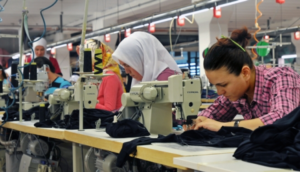Fatema, a garment operator in Dhaka, Bangladesh, got no sleep before her shift that day. With floodwater seeping into her family’s home, she spent hours moving her family’s belongings onto their bed. When she arrived at work exhausted and with muddy clothes from walking to the factory, the lack of soap and clean water combined with production pressure meant there Fatema couldn’t wash her legs which quickly got infected. What started as heavy rain ended in surgery at a private hospital she couldn’t afford, followed by unpaid sick leave and workplace harassment for reduced productivity.
As the intensity and frequency of hot days and floods increase, climate change is happening now, making Fatema’s story the daily reality for garment workers across Bangladesh and Cambodia.
The Many Ways Climate Hazards Impact Workers
RISE’s recent research, directly involving dozens of workers, highlights how climate hazards cascade through every aspect of workers’ lives. Heatwaves, floods, and extreme weather create a web of consequences that affects women hardest.
Workers are experiencing severe health issues, from fainting spells in overheated factories to waterborne diseases contracted during floods. Beyond the physical toll, cultural norms compound these challenges while the mental health burden grows significantly. Stress and anxiety are rising, particularly among women who shoulder greater unpaid care and domestic work during climate events, often while navigating traditional expectations that leave them more vulnerable.
The financial impact is equally significant. When homes are damaged by floods or storms, families face unexpected repair expenses at the worst possible time. Food prices spike when crops fail due to extreme weather, stretching already tight household budgets. Workers miss days of work due to illness or the need to care for family members, which directly reduces their already low wages. During heatwaves, the challenges multiply as food spoils faster, forcing women to cook more frequently and adding hours of unpaid work to their already exhausting days.
Most troubling is how climate stress fuels increased harassment and violence. Supervisors, frustrated by production disruptions caused by weather events, take it out on workers. At home, the economic hardship created by climate impacts intensifies domestic tensions, putting women at even greater risk.
A Collaborative Path Forward for the Sector
These issues workers raised also show a way towards solutions. During workshops in Dhaka, stakeholders identified three types of actions, which you can read more about in the RISE report:
- Improve factory environments by tracking temperature impacts and upgrading infrastructure with input from workers.
- Reimagine operations by incorporating climate impacts into audits and establishing clear safety protocols for extreme weather events.
- Strengthen support systems by expanding safety nets and financial products, such as insurance, to help workers weather climate-related shocks.
These stories remind us that climate action in the garment, footwear and home textiles sector is about lives and livelihoods today as much as it is about long-term resilience. Every day we delay, more workers like Fatema face impossible choices between their health and their livelihoods. We now need collaboration among brands, manufacturers, governments, and women’s organizations, with workers at the center of every decision.
If we listen to workers’ voices today, we can build a more just and climate-resilient industry for everyone









